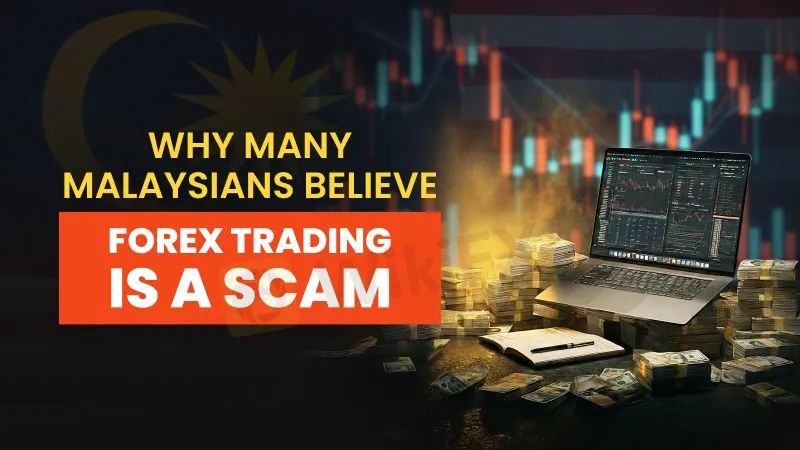简体中文
繁體中文
English
Pусский
日本語
ภาษาไทย
Tiếng Việt
Bahasa Indonesia
Español
हिन्दी
Filippiiniläinen
Français
Deutsch
Português
Türkçe
한국어
العربية
Why Many Malaysians Believe Forex Trading Is a Scam
Abstract:Forex trading is one of the world’s largest financial markets, attracting millions of traders across the globe. Yet in Malaysia, many people continue to view forex trading with deep suspicion. For some, the word “forex” immediately signals fraud. This perception has grown over the years, fuelled by bad experiences, misleading information, and high-profile scams. But is forex itself a scam?

Forex trading is one of the worlds largest financial markets, attracting millions of traders across the globe. Yet in Malaysia, many people continue to view forex trading with deep suspicion. For some, the word “forex” immediately signals fraud. This perception has grown over the years, fuelled by bad experiences, misleading information, and high-profile scams.
But is forex itself a scam? The short answer is no. Forex trading, when done through legitimate, regulated brokers, is a recognised form of financial investment. The problem lies in the number of unlicensed operators and fraudsters who have used “forex” as a disguise for illegal activities.
So why do so many Malaysians hold this misconception? Lets break down the key reasons.
1. High Number of Scam Cases in the Past
Malaysia has seen countless cases of so-called “forex schemes” over the years. These were not real trading activities but rather Ponzi schemes or investment scams that used the forex name to appear legitimate.
Victims were promised guaranteed profits, often with returns as high as 20–30% per month. Instead of actually trading, the organisers paid old investors with money from new ones until the scheme collapsed. When the news broke, the public associated the entire forex industry with fraud.
For many Malaysians, these high-profile failures left a lasting impression: forex equals scam.
2. Lack of Public Understanding
Forex trading is complex, involving global currencies, leverage, and rapid price changes. For those unfamiliar with financial markets, it can appear confusing or even suspicious.
Scammers exploit this lack of knowledge. By using technical jargon and making exaggerated claims, they mislead people into thinking that forex is an easy way to get rich. When victims eventually lose money—either through scams or poor trading decisions—the blame often falls on forex itself rather than the fraudsters or the risks of the market.
3. Regulatory Restrictions in Malaysia
In Malaysia, the Securities Commission (SC) and Bank Negara Malaysia (BNM) strictly regulate financial activities. Retail forex trading with overseas brokers is restricted, and only licensed institutions are allowed to offer such services.
As a result, many Malaysians who trade forex do so through unlicensed offshore brokers. These brokers are not protected by Malaysian law, making them riskier. When problems arise—such as frozen withdrawals or manipulated trades—victims often conclude that forex trading itself is illegal or fraudulent.
This confusion between regulatory limits and scams has contributed to the negative perception.
4. Cultural and Religious Concerns
Another factor is religion. In a Muslim-majority country like Malaysia, some debates continue about whether forex trading complies with Islamic finance principles. While certain forms of speculative trading are seen as non-compliant, many regulated brokers now offer Islamic or “swap-free” accounts to meet Shariah requirements.
However, the ongoing debate adds to the uncertainty and fuels scepticism among the public.
5. Media Coverage and Public Opinion
Media reports often highlight victims of forex scams, focusing on the emotional and financial losses involved. While it is important to expose fraud, this type of coverage can unintentionally reinforce the idea that all forex trading is unsafe.
At the same time, positive stories of successful and legitimate forex trading rarely make headlines. The imbalance in reporting has shaped public opinion in a way that leans towards fear and mistrust.
The Truth About Forex Trading
Forex trading itself is not a scam. It is a regulated market where currencies are traded globally every day by banks, corporations, and investors. The scams come from unlicensed brokers, fraudulent schemes, and individuals exploiting the forex label.
The key difference lies in choosing the right broker. Regulated brokers operate under strict oversight, ensuring transparency and accountability. Scammers, on the other hand, hide behind false promises and fake credentials.
How WikiFX Helps Malaysians Trade Safely
For Malaysians who want to explore forex but fear scams, the solution lies in verification and research. This is where WikiFX plays an essential role.

WikiFX is a trusted global platform that investigates brokers and provides transparent information for traders. With the free WikiFX mobile app, available on Google Play and the App Store, Malaysians can:
- Verify if a broker is properly regulated.
- Read user reviews to see real experiences.
- Identify blacklisted or high-risk brokers.
- Get alerts on new scams and suspicious activities.
By checking a broker on WikiFX before investing, Malaysians can separate genuine opportunities from scams and make informed decisions.
Final Word
The belief that forex is a scam is widespread in Malaysia, but it is based more on bad experiences and misinformation than on fact. While scams have damaged the reputation of forex trading, the market itself is legitimate and operates worldwide under strict regulation.
What Malaysians need is not fear, but knowledge. By learning to tell the difference between legal trading and fraudulent schemes and by using resources like WikiFX, traders can protect themselves and take part in the global forex market with confidence.
Download the WikiFX app today on Google Play or the App Store, and discover the truth behind forex without the fear of scams.

Disclaimer:
The views in this article only represent the author's personal views, and do not constitute investment advice on this platform. This platform does not guarantee the accuracy, completeness and timeliness of the information in the article, and will not be liable for any loss caused by the use of or reliance on the information in the article.
WikiFX Broker
Latest News
FINRA Fines Cetera $1.1 Million Over Compliance Lapses
FINRA Fines Cetera $1.1 Million Over Compliance Lapses
Upway (JRJR) Review: A Deep Dive into Safety and Regulation
Coinbase Banks Push Advances Crypto Rules
RM668K Gone Overnight: Factory Supervisor Trapped in Fake Investment Scam
Dollar Softens as Fed Signals Shifts; Warsh Leads Nomination Race
Safe-Haven Supercycle: Gold Hits $4,690 as Silver Squeeze Intensifies
Trans-Atlantic Rupture: Markets Brace for Trade War as Trump Issues Greenland Ultimatum
China Delivers 5% Growth Target, Yet December Data Reveals Deepening Consumption and Property Cracks
Italy’s Consob Blocks Five Unauthorized Investment Websites in New Enforcement Action
Currency Calculator



